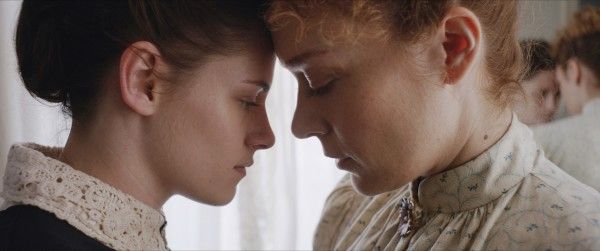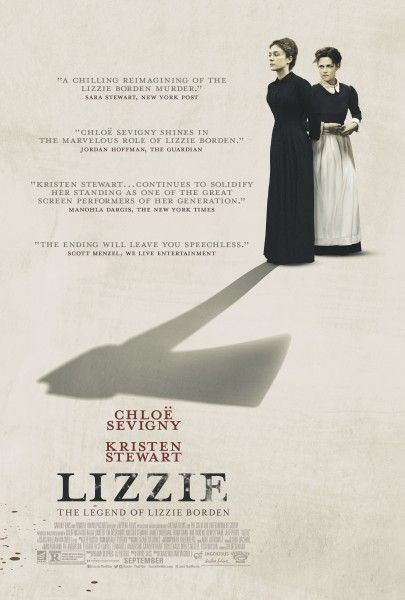[This is a repost of my review from the 2018 Sundance Film Festival. Lizzie opens today in limited release.]
Lizzie Borden’s (alleged) crime of murdering her parents with an axe was so horrific that we still know about it over a hundred years later. Director Craig William Macneill brings this story to the big screen with Lizzie, but in his attempt to studiously avoid sensationalism, he runs into the opposite problem where his movie comes off as cold and remote. The movie occasionally flirts with interesting ideas regarding the power of women in society, but it never goes far enough to leave a lasting impression. Despite great performances from leads Chloe Sevigny and Kristen Stewart, Lizzie ultimately gets stuck between trying to be a mature examination of a horrific crime and being as titillated by the murders as the rest of us.
On August 4, 1892, Andrew and Abbie Borden were found hacked to death by an axe. The prime suspect was their daughter Lizzie (Sevigny). The movie then cuts back six months to the arrival of Bridget Sullivan (Stewart) at the Bordens’ home to work as their maid. The willful Lizzie and the timid Bridget immediately hit it off with Lizzie teaching Bridget how to read. However, both face hardship inside the household from Andrew, who sexually assaults Bridget in her room at night and verbally and physically abuses the rebellious Lizzie. Lizzie is also concerned that her scheming Uncle John (Denis O’Hare) plans to steal her inheritance.
The chemistry between Sevigny and Stewart is electric, and Sevigny in particular is remarkable as Lizzie. She’s always ready with a cutting remark, but the character doesn’t come off as “movie clever”, like she has a writer’s room full of retorts. If anything, everything Lizzie does seems self-destructive in some way, and while Sevigny is cryptic enough to almost be a cipher, that secrecy keeps our allegiances on edge. We know that Lizzie and Bridget are being abused, but the movie makes sure that Lizzie never comes off as completely a victim or an avenging hero. Instead, she comes off as someone with a firm concept of what she wants and the cold pragmatism to get it. And because the movie engenders no sympathy for her parents, we’re left to decide how much we want to side with Lizzie.
Where Lizzie becomes frustrating is that because Macneill is more concerned with motives and allegiances, he tends to lose sight of the larger societal and gender issues that would enrich his film. The movie will occasionally come up to an interesting idea of the extent of a woman’s power during the late 19th century, comparing the wealthy Lizzie to the working class Bridget, but it never really runs with that idea as it keeps its focus more on the facts of the case and leaving the audience guessing as to how the crime unfolded until the very end.
By coldly laying out the facts of the case, relying on an inharmonious score, and keeping everything very prim and proper, it’s like Macneill wants to avoid what made the case so captivating to the media at the time, but ultimately there’s no way around his own argument that Lizzie and Bridget had an affair and conspired together to murder Lizzie’s parents with a hatchet. That’s not to say that Macneill must further sensationalize the narrative, but his approach is so remote that at times Lizzie comes off as a series of reenactments for a History Channel documentary but with higher production values.
There’s nothing particularly bad about Lizzie, but it ultimately feels like a missed opportunity, especially with two great actors in the lead roles. If all Macneill cares about is the facts of the case, that’s fine, but those facts have been known for a while now, and Lizzie can’t seem to do more than create a build up to a bloody crime that’s a gruesome piece of history and not much else.
Rating: B-



